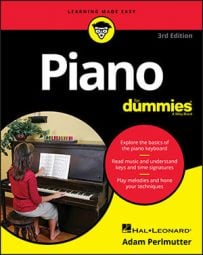Nothing helps your own piano playing like checking out the experts. Many of the great composers of classical and romantic eras were also keyboard players — some of them better known for their playing ability than for the music they wrote. Whether they used a piano, harpsichord, or pipe organ, these old masters managed to find a set of black and white keys to suit their styles.
Johann Sebastian Bach
Regarded by many as the forefather of Western music — not to mention that he was the actual father of many musicians — German musician Johann Sebastian Bach (1685–1750) learned to play the violin under the tutelage of his father. After his parents died, Bach moved in with his big brother, who taught him to play the organ.
At the age of 18, Bach got a job as a church organist. This job didn’t last long — the church said he improvised too much. He took a job at another church in Weimar, where he had to compose a new piece for the choir and organ every month.
Thankfully, that church didn’t discourage Bach’s improvisations, thus giving the world many much-loved masterpieces. These include two volumes of preludes and fugues, called The Well-Tempered Clavier, which remain a touchstone of piano music.
Ludwig van Beethoven
One of the greatest composers who ever lived, German-born Ludwig van Beethoven (1770–1827) was also a piano virtuoso. His playing and original piano pieces were in high demand throughout his career. Unlike many other composers, he became a celebrity during his lifetime.
He changed the rules of music and shocked the public, but people still lined up to buy his next piano sonata. Although Beethoven was opposed to naming his sonatas, his publisher insisted that he do so. Names like Moonlight and Appassionata sold sheet music by the bundle.
Johannes Brahms
The piano music of Johannes Brahms (1833–1897) may have been influenced by Brahms’s experience playing the piano in the saloons of Hamburg, Germany, as a young man.
You can hear a connection to the real world through his melodies and dance rhythms. He wove together melodic, harmonic, and rhythmic elements and took them to the peak of artistic expression. Even his “easier” pieces are a challenge, but they’re well worth the practice. Brahms’s piano music is incredibly satisfying both to listen to and to play.
Frederic Chopin
Almost all of Frederic Chopin’s music is centered on the piano, and many lovers of piano music name Chopin (1810–1849) as their choice of music to take when stranded on that mythic desert island.
He revolutionized the technical possibilities of piano playing but never let that get in the way of a sublime tune. Once you start listening, you’ll be hooked on Chopin’s whole catalog, from piano concertos and études to mazurkas and nocturnes.
Franz Liszt
Hungarian Franz Liszt was taught piano by his father and began to exploit his talents when he was only 9. Young Liszt (1811–1886) toured constantly and never even received a formal education.
A reputation for theatrical and awe-inspiring concerts produced a huge demand for Liszt’s music and an enormous fan club (not to mention a nice-sized ego). He’s rumored to have once played so hard that he broke a piano string! Lisztomania became a cultural phenomenon, and although no Liszt action figures survive, he did leave the world a bizarre relic: a plaster cast of his hands made upon his death.
Wolfgang Amadeus Mozart
Perhaps the most famous child prodigy, young Austrian Wolfgang Amadeus Mozart turned to his father for lessons. At the age of 5, Mozart (1756–1791) began composing — not just piano pieces, but full-scale symphonic works. He had an amazing memory and infallible ear for music, which allowed him to play entire sonatas perfectly after hearing them only once.
His father proudly paraded his son’s talents in front of nobility all across Europe with a road show that lasted 14 years. Mozart’s piano concertos are regarded today as some of the most important pieces in the keyboard repertoire.
Sergei Rachmaninoff
A Russian-born musician, Sergei Rachmaninoff enjoyed huge success as a composer, conductor, and solo pianist. He also had huge hands, which didn’t hurt his playing. Rachmaninoff (1873–1943) built his own solo repertoire, writing intricate, very difficult compositions.
Among these was the famous “Prelude in C-sharp minor,” which was an enormous hit. Long before the movie Casablanca, audiences would cheer, “Play it again, Sergei!” when he played this prelude. He later referred to this popular piece as the “It” prelude. Even today, Rachmaninoff’s “Piano Concerto No. 3” is regarded as among the most difficult piano concertos ever written.

